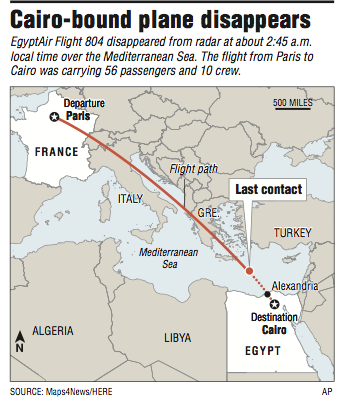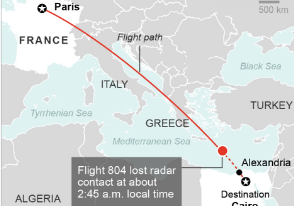CAIRO -- An EgyptAir jetliner en route from Paris to Cairo with 66 people aboard veered wildly in flight and crashed in the Mediterranean Sea early Thursday, authorities said.
There were no signs of survivors.
EgyptAir Flight 804, an Airbus A320 with 56 passengers and 10 crew members, went down about halfway between the Greek island of Crete and Egypt's coastline, about 175 miles offshore, after takeoff from Charles de Gaulle Airport, authorities said.
Greek Defense Minister Panos Kammenos said the plane spun all the way around and suddenly lost altitude just before vanishing from radar screens around 2:45 a.m. Cairo time, about 45 minutes before its scheduled landing time.
He said it made a 90-degree left turn, then a full 360-degree turn to the right, plummeting from 38,000 feet to 15,000 feet. It disappeared at about 10,000 feet, he said. There were no reports of stormy weather at the time.
Those on board, according to EgyptAir and various governments, included were 15 French passengers, 30 Egyptians, two Iraqis, one Briton, one Kuwaiti, one Saudi, one Sudanese, one Chadian, one Portuguese, one Belgian, one Algerian and two Canadians. Three children -- including two infants -- were aboard, officials said.
Among the passengers, according to employers and officials, were the Egypt-raised manager of a Procter & Gamble plant in Amiens, France; a Saudi woman who works at the Saudi Embassy in Cairo; the sister-in-law of an Egyptian diplomatic official in Paris; and a student at France's Saint-Cyr military academy who was heading home to Chad to mourn his mother.
Egyptian and Greek authorities in ships and planes searched the suspected crash area throughout the day for traces of the airliner or its victims, with more help on the way from the U.S., the United Kingdom and France.
In Washington, President Barack Obama directed U.S. officials "to reach out to their international counterparts to offer support and assistance," White House spokesman Eric Schultz said.
But as night fell, searchers had yet to find any confirmed debris, dismissing reported sightings of life vests and other floating material.
Civil Aviation Minister Sherif Fathi cautioned against drawing any conclusions about the cause of the crash.
"I don't want to go to speculations and I don't want to go to assumptions," Fathi said. Still, he added: "The possibility of a terror attack is higher than a malfunction. But again, I don't want to hypothesize."
Alexander Bortnikov, chief of Russia's top domestic security agency, went further, saying: "In all likelihood, it was a terror attack."
Intelligence analysts who monitor jihadi websites and social media said there had been no claims of responsibility by terrorist groups.
If it was terrorism, it would be the second deadly attack involving Egypt's aviation industry in seven months.
In October, a Russian passenger plane that took off from the Red Sea resort city of Sharm el-Sheikh crashed in the Sinai Peninsula, killing all 224 people aboard. Russia said it was brought down by a bomb, and a regional branch of the Islamic State claimed responsibility.
Thursday's disaster also raises questions about security at de Gaulle Airport, at a time when Western Europe has been on high alert over the deadly Islamic extremist attacks in Paris and at the Brussels airport and subway over the past six months.
French Foreign Minister Jean-Marc Ayrault said airport security had been tightened considerably before the disaster, in part because of the coming European soccer championship, which France is hosting.
Signal from Plane
Flight 804 had gone as scheduled while it crossed Europe, passing over northern Italy and down the Adriatic coast. As the plane left Greek airspace, the pilot "was in good spirits and thanked the controller in Greek," according to Greece's civil-aviation agency.
The Egyptian military said it did not receive a distress call from the doomed plane, and Egypt's state-run newspaper Al-Ahram quoted an unidentified airport official as saying the pilot did not send one.
That could mean that whatever sent the aircraft plummeting into the sea was sudden.
Its erratic course suggested a number of possible explanations, including a catastrophic mechanical or structural failure, a bombing or a struggle over the controls in the cockpit.
Egyptian security officials said they were running background checks on the passengers to see whether any had links to extremists.
Nearly two hours after the last radar contact, the plane emitted a signal although it was not clear whether that was an emergency distress signal sent by a crew member or an automated signal from the plane's onboard computers.
"We don't know if the pilot had something to do with this or if it is just the plane sending it," said Ihab Raslan, a spokesman for the Egyptian Civil Aviation Ministry.
In the U.S., the FBI offered its assistance in the investigation. FBI Director James Comey said the bureau has no evidence yet that the plane was brought down intentionally.
U.S. Rep. Adam Schiff of California, the ranking Democrat on the House Intelligence Committee, said there is much that is unknown.
"We are looking through our intelligence collections to figure out if we have any images. Do we have any signals intelligence that reveals a discussion of a plot like this?" Schiff said.
"We're working with the French to try to figure out is there any information we have that could shed light on any of the passengers, but there's nothing yet to confirm the cause of the plane crash."
He said the plane seemed to have broken apart in flight, but why is unclear.
French Join Hunt
In Paris, the city prosecutor's office opened an investigation. "No hypothesis is favored or ruled out at this stage," it said in a statement.
French President Francois Hollande held an emergency meeting at the Elysee Palace. He also spoke with Egyptian President Abdel-Fattah el-Sissi by telephone and agreed to "closely cooperate to establish as soon as possible the circumstances" surrounding the disaster, according to a statement.
Hollande said "no hypothesis was being ruled out" and officials were hoping to recover "debris that would enable us to know the truth."
In addition to joining the search-and-rescue operation, France sent a team of accident investigators.
Amr Sami, a regional EgyptAir spokesman at de Gaulle Airport in Paris, said EgyptAir flights from the French capital will continue as scheduled.
In Cairo, el-Sissi convened an emergency meeting of the National Security Council, the country's highest security body. It includes the defense, foreign and interior ministers and the chiefs of the intelligence agencies.
Families of passengers gathered at the Cairo airport, desperate for any news. Authorities took doctors to the scene after several distressed family members collapsed.
"They don't have any information," said Mohamed Ramez, whose in-laws were on the plane. "But obviously there is little hope."
Aviation security officials barred journalists from filming and further interviewing people, saying they were acting on orders from the Interior Ministry, which controls the police.
At de Gaulle Airport, a man and woman sat at an information desk near the EgyptAir counter, the woman sobbing into a handkerchief, before they were led away by police.
Airbus expressed regret over the "loss" of the aircraft in a Facebook statement.
The Airbus A320 is a widely used twin-engine plane that operates on short- and medium-haul routes. Nearly 4,000 A320s are in use around the world. Such aircraft are typically built to last 30 or 40 years.
The last deadly crash involving one of the planes was in March 2015, when one of the pilots of a Germanwings flight deliberately slammed it into the French Alps, killing all 150 people aboard.
The pilot of EgyptAir Flight 804 had more than 6,000 hours of flying time, including more than 2,000 hours flying the same model as the vanished aircraft, EgyptAir said. The co-pilot had nearly 3,000 flying hours.
Airbus said the aircraft in Thursday's disaster was delivered to EgyptAir in 2003 and had logged 48,000 flight hours.
The plane had been in service for more than 17 of the previous 24 hours before the crash, traveling from Asmara, Eritrea, to Cairo, then a round-trip to Tunis, before heading to Paris.
Information for this article was contributed by Maggie Michael, Elena Becatoros, Raphael Satter, Derek Gatopoulos, Nicholas Paphitis, Angela Charlton, Sylvie Corbet, Deb Riechmann, Eric Tucker and Hamza Hendawi of The Associated Press; by Heba Habib, Sudarsan Raghavan, Brian Murphy, James McAuley, Erin Cunningham, Yanan Wang, Missy Ryan, Sarah Kaplan and Ashley Halsey of The Washington Post; and by Declan Walsh, Kareem Fahim, Nour Youssef, Dimitris Bounias, Niki Kitsantonis, Nikolas Leontopoulos, Liz Alderman, Aurelien Breeden, Sewell Chan, Nicola Clark, Daphne Angles, Benoit Morenne, Alissa J. Rubin, Eric Schmitt and Rick Gladstone of The New York Times.
A Section on 05/20/2016

